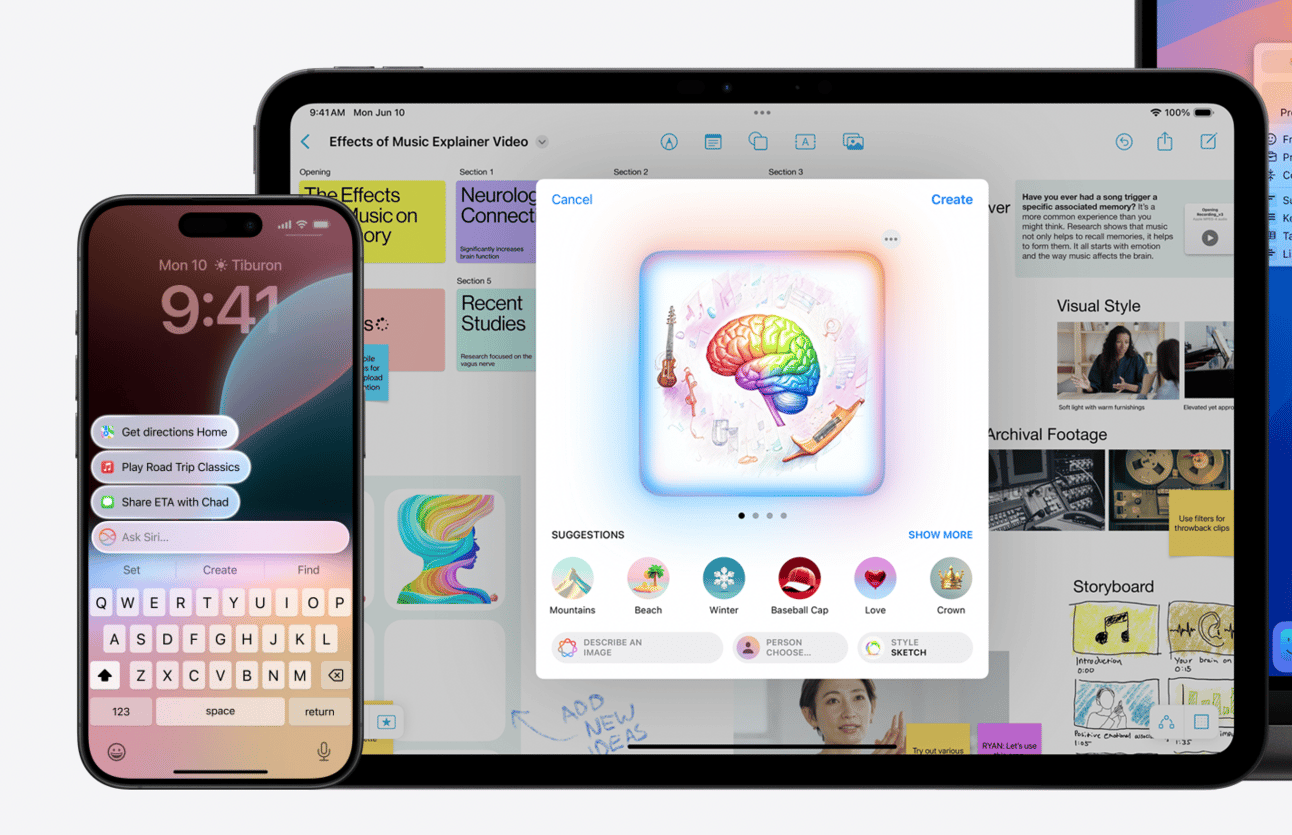
Welcome, AI Enthusiasts.
Apple Intelligence, included in iOS 18, introduces various AI-driven features, though most users won't access them until the public release with iOS 18.1 in October 2024.
Johns Hopkins University is using AI to explore how life survives in extreme environments, both on Earth and potentially on other planets.
In today’s issue:
🤖 Apple
🦾 Johns Hopkins
🛠️ New AI Products
🥋 AI Dojo
🤖 Quick Bytes
Read time: 5 minutes.
LATEST HIGHLIGHTS

Image source: Apple
To recap: Apple Intelligence, included in iOS 18, introduces various AI-driven features, though most users won't access them until the public release with iOS 18.1 in October 2024. Key features include:
- Writing tools for text proofreading, tone adjustment, and summarization.
- New Siri with enhanced understanding, improved animations, and text-based interaction.
- Image cleanup in Photos to remove unwanted objects or people.
- Photo Memories creation and advanced search capabilities.
- Notification and Mail summaries, organizing messages and emails by priority.
- Phone and Notes updates for call transcription and summarization.
These features will initially be available on iPhone 15 Pro, Pro Max, and the iPhone 16 series. Upcoming updates will expand to new regions, languages, and include more advanced capabilities like image creation, priority notifications, and ChatGPT integration. Full global support will roll out through 2024 and beyond, though Apple Intelligence won’t be available in China.
The details:
1. Writing Tools: AI-powered tools will allow users to proofread, summarize, and adjust the tone of their text. This feature will roll out in October 2024 with iOS 18.1.
2. Image Cleanup in Photos: Similar to Google's Magic Eraser, users can remove unwanted objects from images, available with the iPhone 15 Pro, Pro Max, and iPhone 16 series.
3. Siri Upgrade: Siri will gain improved understanding of requests, allowing users to chat through text and manage more complex tasks. This update also arrives in October with iOS 18.1.
Here is the key takeaway: The key takeaway is that Apple Intelligence, launching with iOS 18.1 in October 2024, will introduce AI-powered features like advanced writing tools, enhanced Siri capabilities, and image cleanup, initially available on the latest iPhone models. These features signal Apple's deeper integration of AI to enhance user experience, with broader support and updates planned for 2024 and beyond.

Image source: Giphy
In Summary: Johns Hopkins University is using AI to explore how life survives in extreme environments, both on Earth and potentially on other planets. By simulating deep ocean conditions, scientists discovered how proteins from the heat-resistant microbe Thermus thermophilus adapt under intense pressure. These findings suggest that life could survive in high-pressure environments, such as deep-sea trenches or extraterrestrial oceans. The study, which utilized Google’s AlphaFold AI, highlights AI's potential to accelerate research into the origins of life and astrobiology, with future experiments planned to study deep-sea organisms.
Key points:
1. AI Simulation of Extreme Conditions: Johns Hopkins used AI to simulate deep ocean conditions, revealing how proteins evolve under immense pressure, which could provide insights into life on Earth and other planets.
2. Discovery of Protein Flexibility: The study found that proteins in the microbe Thermus thermophilus have a unique flexibility, allowing them to compress under pressure without collapsing, offering clues about life’s adaptation to harsh environments.
3. Potential for Extraterrestrial Life: The findings suggest that life on other planets, particularly in high-pressure environments like deep oceans, might be possible.
4. AI’s Role in Accelerating Research: The use of AI, specifically AlphaFold, significantly sped up research, highlighting its importance in advancing scientific understanding of complex processes like protein folding.
Our thoughts: We find this study fascinating for several reasons:
1. AI’s Expanding Role in Science: The use of AI, especially in such specialized applications like protein folding, underscores how AI isn't just about chatbots or automation but also about revolutionizing research. It shows how AI can handle tasks humans would find impossible due to the complexities and extreme conditions involved.
2. Interdisciplinary Impact: This research is a perfect example of how technology, biology, and astrophysics converge. By using AI to simulate extreme environments, scientists are pushing the boundaries of our understanding not only of life on Earth but also of the potential for life elsewhere in the universe. It makes the case for AI as a tool in fields beyond tech and engineering.
3. Acceleration of Discoveries: The fact that AI accelerated what would typically take decades of research to just a few years highlights the immense potential AI has in reshaping scientific timelines. We’re moving towards an era where AI can explore and solve some of humanity’s oldest questions at a much faster pace.
4. Future Implications: This opens up exciting possibilities for the future of astrobiology and the search for extraterrestrial life. By understanding how life adapts to extreme conditions, we’re not only getting closer to answering questions about life’s origins but also preparing for discoveries in space exploration, powered by AI.
This study emphasizes that AI is becoming an indispensable tool in scientific research, with the ability to push the frontiers of knowledge.
TRENDING TECHS
🛠 LogoFast- Make beautiful logos with AI
🦾 TensorFlow-An end-to-end open source machine learning platform
🤖 Wordware- Web-hosted IDE for building AI agents
AI DOJO
AI-Powered Document Drafting and Proofreading
Scenario
Imagine you're an office worker tasked with writing a client proposal, a project report, or even daily communications like emails. These documents are essential to your job but can be time-consuming and often require back-and-forth editing.
How AI Helps
Content Generation:
AI can assist you in generating the initial draft based on prompts or key details you provide. Let’s say you're writing a project report — you can input key points, like project milestones, achievements, and challenges, and AI will craft these into coherent paragraphs. This takes away the initial hurdle of staring at a blank page, allowing you to focus on refining rather than writing from scratch.
Tone Adjustment:
In office communication, maintaining the right tone is crucial. Whether you’re drafting a formal client proposal or sending a casual internal email, AI can adjust the language. You might instruct it to make the text more formal, friendly, concise, or detailed, ensuring the tone aligns with your intent and the audience. This is particularly helpful when sending sensitive emails or client-facing documents.
Grammar and Style Checks:
AI tools can analyze your text for grammar, punctuation, and style errors. Beyond basic spell-checking, AI ensures that sentences flow well and are clear and concise. If you're writing an important business proposal, AI can remove awkward phrasing, flag repetitive language, and improve overall readability. This significantly reduces time spent editing.
Summarization:
If you're dealing with long reports or detailed emails, AI can quickly summarize the content. For example, after writing a comprehensive project update, you can ask AI to generate a brief executive summary that highlights key points, ensuring busy stakeholders can quickly grasp the essentials.
Smart Suggestions:
AI tools like Grammarly or ChatGPT can go a step further, providing suggestions for improving clarity and impact. For instance, if a sentence is too passive, AI might suggest a more direct alternative. It can also recommend replacing weak words (e.g., “good”) with stronger alternatives (e.g., “excellent”) to make your writing more persuasive or assertive.
Impact in the Workplace
- Time Efficiency: With AI handling drafting, proofreading, and editing, employees spend less time on content creation, allowing them to focus on more strategic tasks.
- Improved Communication: AI ensures clarity and professionalism in every document, reducing the risk of miscommunication.
- Consistency: AI can ensure consistent tone and style across different documents, especially when multiple people contribute to reports or proposals.
In a busy office environment, these AI capabilities can help maintain high-quality writing while saving valuable time, ultimately boosting productivity and communication efficiency.
QUICK BYTES
A Financial Times profile reveals SoftBank CEO Masayoshi Son reflecting on his struggles, admitting to feeling ashamed of his achievements after significant losses from investments like WeWork. Despite this period of relative silence, Son has been strategizing a comeback, now focusing heavily on AI and successfully moving chip design company Arm toward a public offering. The profile also shares personal anecdotes, including Son’s fascination with historical figures like Napoleon, whom he sees as a more fitting comparison for his ambitions than contemporary business leaders.
Jony Ive, the renowned designer who left Apple five years ago, is collaborating with OpenAI and CEO Sam Altman on a new startup. First reported last year, the partnership was confirmed in a recent New York Times profile detailing Ive's activities since his departure from Apple. Although the startup's name remains under wraps, it aims to create an AI-driven computing experience that is less socially disruptive than the iPhone. Industrial designer Marc Newson, also involved in the project, noted that product details and release timelines are still pending. The startup is currently fundraising, targeting up to $1 billion by year-end, with contributions from Laurene Powell Jobs’ Emerson Collective and Ive himself.
Top Product Announcements of 2024 from Apple, Google, Microsoft, and More
In 2024, major tech companies showcased a range of innovative products at various conferences, including Apple's iPhone 16, which features advanced AI integration, enhanced camera capabilities, and new models with the A18 Pro chip. Apple also introduced the Watch Series 10, offering health monitoring features, and the AirPods 4, which come with USB-C charging. Meanwhile, Google unveiled the Pixel 8 Pro and advancements in its AI, while Microsoft presented its AI-first Copilot+ PCs. At Mobile World Congress, companies like Lenovo and Xiaomi showcased futuristic concepts, including a transparent laptop and an electric car, respectively. CES featured a mix of unusual gadgets, highlighting Samsung's home automation innovations and LG's transparent OLED TV.
SPONSOR US
🦾 Get your product in front of AI enthusiasts
THAT’S A WRAP
